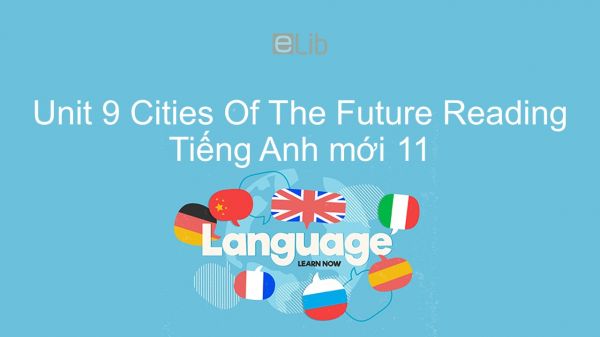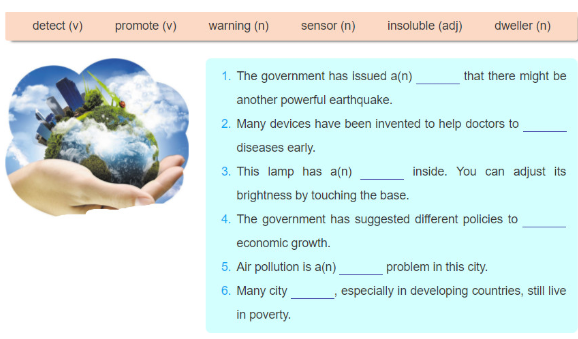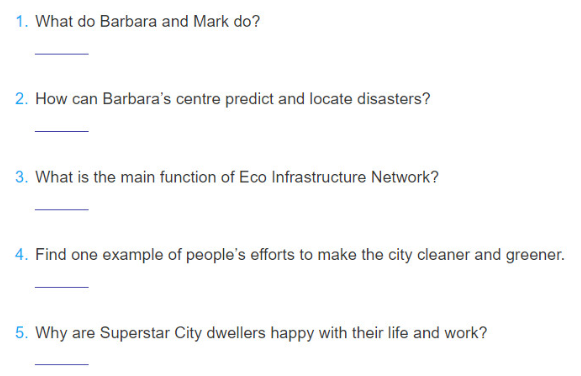Unit 9 lớp 11: Cities Of The Future - Reading
Bài học Unit 9 lớp 11 mới phần Reading hướng dẫn các em xây dựng từ vựng, đọc hiểu về thành phố của mai sau. Thông qua các dạng bài tập khác nhau, các em thu thập nhiều thông tin về thành phố Superstar trong năm 2060. Mời các em cùng tham khảo!
Mục lục nội dung

Unit 9 lớp 11: Cities Of The Future - Reading
Tomorrow's city (Thành phố của mai sau)
1. Task 1 Unit 9 lớp 11 Reading
Use a dictionary to find the meaning of the words in the box. Then complete the sentences with their correct forms. (Dùng từ điển tìm nghĩa của từ cho khung sau đó hoàn thành câu câu bằng dạng đúng của những từ đó)

Guide to answer
1. a warning
2. detect
3. a sensor
4. promote
5. an insoluble
6. dwellers
Tạm dịch:
1. Chính phủ đã đưa ra cảnh báo rằng có thể có một trận động đất mạnh nữa.
2. Nhiều thiết bị đã được phát minh để giúp các bác sĩ phát hiện bệnh sớm.
3. Đèn này có cảm biến bên trong. Bạn có thể điều chỉnh độ sáng của nó bằng cách chạm vào đế.
4. Chính phủ đã đưa ra các chính sách khác nhau để thúc đẩy tăng trưởng kinh tế.
5. Ô nhiễm không khí là một vấn đề không giải quyết được của thành phố này.
6. Nhiều người dân thành phố, đặc biệt là ở các nước đang phát triển, vẫn còn sống trong nghèo đói.
2. Task 2 Unit 9 lớp 11 Reading
Read the text about Superstar City and choose the best title for it.(Đọc bài nói về thành phố Superstar và chọn tiêu đề cho đoạn đọc)
a. Superstar City's Infrastructure Network
(Mạng lưới cơ sở vật chất của thành phố Siêu sao)
b. Superstar City - A Safe Place to Live
(Thành phố Siêu sao – Một nơi an toàn để sống)
c. A Safe and Green City
(Một thành phố an toàn và sạch)
Now is the year 2060. Barbara is an engineer working for Hi-tech Operation Centre of Superstar City. Her job is to detect and analyse any threats to public safety such as floods, earthquakes, and even pollution. Thanks to various sensors installed in every home and public place, Barbara’s centre can predict probable disasters, identify their locations and send a rescue team to help the people in danger. If warnings and assistance are given in good time, people’s lives are well protected.
Barbara’s husband, Mark, is working for Eco Infrastructure Network, whose main function is to deal with urban environmental problems to make Superstar City greener, cleaner and more sustainable. Mark and his colleagues are city planners. They design and carry out projects aiming to reduce fossil fuel consumption, find renewable fuels for public transport, and promote other clean air efforts. Thanks to these projects, city dwellers mainly use wind and sun energy for cooking, lighting and heating their homes. To ensure there is no shortage of fresh water, wastewater is treated and turned into drinking water. These projects have proved to be very effective in dealing with global climate change, which was considered an insoluble problem in the first thirty years of this century.
Like most Superstar City dwellers, Barbara and Mark are quite happy with their life and work. They have to work only four days a week, four hours a day. Everybody has more time for study, entertainment and relaxation. This safe, environmentally friendly city is like a paradise for its inhabitants who can enjoy the highest quality of life.
Guide to answer
c. A Safe and Green City
Tạm dịch:
Bây giờ là năm 2060. Barbara là một kỹ sư đang làm việc cho Trung Tâm Điều Khiển Công Nghệ Cao của thành phố Superstar. Công việc của cô ấy là dò tìm và phân tích những mối đe dọa cho sự an toàn của công chúng như lụt lội, động đất và thậm chí cả sự ô nhiễm. Nhờ có những bộ dò tìm bằng cảm ứng được lắp đặt trong mọi gia đình và nơi công cộng mà trung tâm của Barbara có thể dự đoán khá năng xảy ra thiên tai, xác định được những nơi sẽ xảy ra và cử đội cứu hộ đến giúp những người gặp nguy hiềm. Nếu cảnh báo và sự hỗ trợ được đưa ra đúng lúc thì cuộc sống của người dân sẽ được bảo vệ tốt.
Chồng của Barbara, Mark, đang làm việc cho Mạng lưới Cơ sở hạ tầng Sinh thái có chức năng chính là giải quyết những vấn đề môi trường để làm cho thành phố Superstar xanh hơn, sạch hơn và thân thiện với môi trường hơn. Mark và các đồng nghiệp của anh đều là những nhà hoạch định đô thị. Họ thiết kế và thực hiện các dự án nhằm giảm bớt sự tiêu thụ nhiên liệu, tìm nguồn nhiên liệu có thể tái tạo được dành cho giao thông công cộng, thúc đẩy những nỗ lực làm trong sạch bầu không khí. Nhờ có những dự án này mà người dân thành phố chủ yếu sử dụng sức gió và năng lượng mặt trời đế nấu nướng, thắp sáng và sưởi ấm trong nhà. Để bảo đảm không có sự thiếu hụt nước sạch, nước thải được xử lý và biến thành nước uống. Những dự án này đã chứng tỏ rất có hiệu quả trong việc xử lý biến đổi khí hậu được xem là một vấn đề không giải quyết được trong 30 năm đầu của thế kỷ này.
Giống như những người dân của thành phố Superstar, Barbara và Mark rất vui với cuộc sống và công việc. Họ chỉ phải làm 4 ngày một tuần, 4 giờ một ngày. Mọi người đều có thêm thời gian để học, giải trí và thư giãn. Thành phố an toàn và thân thiện với môi trường này giống như thiên đường của người dân, những người có thể hưởng thụ chất lượng cuộc sống tốt nhất.
3. Task 3 Unit 9 lớp 11 Reading
Read the text again and ansewer the questions (Đọc lại đoạn đọc và trả lời câu hỏi)

Guide to answer
1. Barbara is an engineer and Mark is a city planner
2. It can predict and locate probable disasters by using the sensors installed in very home and public place.
3. Its main funtion is to deal with urban environmental problems to make Superstar City greener, cleaner and more sustainable.
4. An example is people's use of renewable fuels for cooking, lighting and heating.
5. Because they have more time for study, entertainment and relaxation; they can enjoy the highest quality of life.
Tạm dịch:
1. Barbara và Mark làm gì?
=> Barbara là một kỹ sư và Mark là người lập kế hoạch cho thành phố.
2. Trung tâm của Barbara có thể dự đoán và xác định thiên tai như thế nào?
=> Nó có thể dự đoán và xác định các thiên tai có thể xảy ra bằng cách sử dụng các cảm biến được cài đặt ở mọi nơi ở và nơi công cộng.
3. Chức năng chính của Mạng Cơ sở hạ tầng Sinh thái là gì?
=> Chức năng chính của nó là giải quyết các vấn đề về môi trường đô thị để giúp cho Thành phố Superstar trở nên xanh hơn, sạch hơn và bền vững hơn.
4. Tìm một ví dụ về nỗ lực của mọi người để làm cho thành phố sạch hơn và xanh hơn.
=> Một ví dụ là người ta sử dụng nhiên liệu tái tạo để nấu ăn, thắp sáng và sưởi ấm.
5. Tại sao cư dân thành phố Superstar lại hài lòng với cuộc sống và công việc của họ?
=> Bởi vì họ có nhiều thời gian hơn để học tập, giải trí và thư giãn; họ có thể hưởng thụ chất lượng cuộc sống cao nhất.
4. Task 4 Unit 9 lớp 11 Reading
Complete the following summary about Superstar City, using the words in the text. (Hãy hoàn thành phần tóm tắt về thành phổ Superstar, dùng từ trong bài đọc.)
Guide to answer
It is the year 2060. Superstar City is a (1) safe place to live in. Its Hi-tech Operation Centre is capable of (2) detecting and locating any (3) threats to public safety. This is also a clean and green city where environmentally friendly (4) energy sources are used. The city planners design and (5) carry out projects which aim to (6) deal with global climate change. Superstar City is a (7) paradise for city dwellers who can enjoy the highest quality of life.
Tạm dịch:
Năm 2060, Superstar City là một nơi an toàn để sinh sống. Trung tâm hoạt động công nghệ cao của nó có khả năng phát hiện và tìm ra bất kỳ mối đe dọa nào đối với an toàn công cộng. Đây cũng là một thành phố sạch và xanh , nơi sử dụng các nguồn năng lượng thân thiện với môi trường. Các nhà quy hoạch đô thị tiến hành các dự án nhằm đối phó với biến đổi khí hậu toàn cầu. Superstar City là một thiên đường dành cho người dân thành phố có thể tận hưởng cuộc sống chất lượng cao nhất.
5. Task 5 Unit 9 lớp 11 Reading
Do you think our cities will all be like Superstar City in the year 2060? Explain your reasons. (Em có nghĩ rằng tất cả các thành phố của chúng ta đều giống thành phố Superstar vào năm 2060 không? Hãy giải thích lý do em đưa ra)
Guide to answer
Students' answers
6. Practice Task 1
Read the following passage and mark the letter A, B, C, or D to indicate the correct answer to each of the questions
A NEW CAPITAL
When the new state of Pakistan was founded in 1947, Karachi acted as the capital city. However, it was difficult for Karachi to remain in this role due to a number of drawbacks such as the climate and the state of the existing buildings. Rather than try to overcome these drawbacks, the government decided to create a new capital city. In 1959, a commission was established to investigate the possible locations of this new city. The advisor appointed to the commission was Dr Doxiadis, a famous architect and city planner.
Dr Doxiadis and his colleagues looked at the various locations. They then produced a report suggesting two possible areas: one just outside Karachi and the other to the north of Rawalpindi. Both locations had advantages as well as disadvantages. Which site was it to be?
The choice between these two options was made after consideration of many factors, such as transportation, the availabilities of water, economic factors, and factors of national interest. Finally, the site north of Rawalpindi was chosen and on the 24th February 1960, the new capital was given the name of ‘Islamabad’ and a master plan was drawn up. This master plan divided the area into three different sections: Islamabad itself, neighbouring Rawalpindi, and the national park.
Each of these three sections had a different role. Islamabad would act as the national's capital and would serve its administrative and cultural needs, whereas Rawalpindi would remain the regional centre with industry and commerce. The third piece of the plan, the national park, was planned to provide space for education, recreation, and agriculture.
Today Islamabad is a thriving city of about 1 million people. It offers a healthy a pollution-free atmosphere, plenty of water, and many green spaces. Guide tree-lined streets, elegant public buildings, and well-organised bazaars and shopping centres. The new capital is a superb example of good urban planning.
Question 1: Why was a commission founded in 1959?
A. to overcome the drawbacks of Karachi as a capital city
B. to create a new capital city for Pakistan
C. to look into possibilities of the locations for a new capital city
D. to appoint an advisor for planning the new capital city
Question 2: How many places were suggested for the new capital city in the initial reports?
A. 1 B. 2 C. 3 D. 4
Question 3: Which of the following factors was NOT considered when choosing the location for the new capital city?
A. the climate and the state of the existing buildings
B. transportation and the availabilities of water
C. economic issues
D. issues of pational interest
Question 4: Which of the following is NOT true according to the passage?
A. Islamabad would serve cultural needs.
B. Rawalpindi would be the regional centre with industry and commerce.
C. The national park would provide space for agriculture.
D. Islamabad would play the most important role of all.
Question 5: What does the passage primarily describe?
A. The history of the two capital cities of Pakistan.
B. The disappearance of the old capital city of Pakistan.
C. The reasons why Islamabad became the new capital city of Pakistan.
D. The choice and development of Islamabad as the modern capital of Pakistan.
7. Practice Task 2
Read the following passage and mark the letter A, B, C or D on your answer sheet to indicate the correct word or phrase that best fits each of the numbered blanks.
Education is also important (1)_____ it helps people get more out of life. It increases their knowledge and understanding of the world. It helps them acquire the skills that make life more interesting and enjoyable, (2)_____ the skills needed to participate in a sport, paint a picture, or play a musical (3)_____. Such education becomes (4)___ important as people gain more and more leisure time. Education also helps people adjust to change. This habit has become necessary because social changes today take place with increasing speed and (5)______ the lives of more and more people. Education can help a person understand these changes and provide him with the skills for adjusting to them.
Question 1: A. therefore B. despite C. although D. because
Question 2: A. such as B. for instance C. such that D. for example
Question 3: A. appliance B. equipment C. instrument D. device
Question 4: A. increased B. increasing C. increase D. increasingly
Question 5: A. effect B. affect C. affective D. effective
Để nâng cao kĩ năng đọc hiểu về chủ đề "Cities Of The Future", mời các em đến với phần trắc nghiệm Unit 9 Reading Tiếng Anh 11 mới sau đây và cùng luyện tập.
9. Conclusion
Kết thúc bài học, các em cần làm bài tập đầy đủ và luyện tập đọc hiểu, trả lời câu hỏi; đồng thời ghi nhớ các từ vựng:
- detect /dɪˈtekt/(v): dò tìm, phát hiện ra
- city dweller/ˈsɪti - ˈdwelə(r)/ (n):người sống ờ đô thị, cư dân thành thị
- urban /ˈɜːbən/(adj): thuộc về đô thị
- quality of life (n): chất lượng sống
Tham khảo thêm
- doc Unit 9 lớp 11: Cities Of The Future - Getting Started
- doc Unit 9 lớp 11: Cities Of The Future - Language
- doc Unit 9 lớp 11: Cities Of The Future - Speaking
- doc Unit 9 lớp 11: Cities Of The Future - Listening
- doc Unit 9 lớp 11: Cities Of The Future - Writing
- doc Unit 9 lớp 11: Cities Of The Future - Communication and Culture
- doc Unit 9 lớp 11: Cities Of The Future - Looking Back
- doc Unit 9 lớp 11: Cities Of The Future - Project




